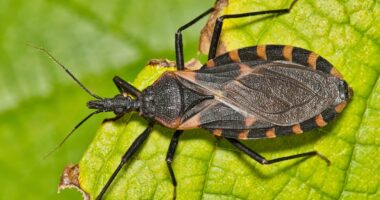Share this @internewscast.com
A dengue-fighting strategy that involves releasing bacteria-infected mosquitoes will be rolled out to six Brazilian cities in the coming months as the country battles a severe outbreak of dengue fever, a viral disease transmitted by the Aedes aegypti mosquito.
Factors such as hotter and wetter weather caused by the climate crisis and the circulation of previously absent subtypes of the virus are fuelling an explosion of dengue in Brazil, which has recorded 1.6m probable cases since January – the same number reported for all of last year – and 491 deaths, with a further 889 deaths under investigation, as of 14 March.
Local and national health authorities have stepped up their response, notably boosting prevention measures, which include community health agents crisscrossing cities on the lookout for containers of stagnant water that could permit mosquitoes to breed.
“Our strategies are old and heavily focused on vector control,” said Ethel Maciel, the secretary for health surveillance at the health ministry. But amid “a significant change in the pattern of dengue” – with earlier and bigger spikes in infections – the government is turning to newer technologies with medium-term results, such as vaccines and the release of mosquitoes infected with bacteria that limit the transmission of dengue and other arboviruses to humans.
The Wolbachia method – named after a type of bacteria found in about 60% of insects but not naturally present in Aedes aegypti – has already been introduced in five Brazilian cities, providing protection to 3.2 million people. An 80m reais (£12.5m) expansion to six new municipalities will cover a further 1.7 million people.
Eggs and larvae of Wolbachia-infected mosquitoes – which Brazilians have nicknamed “wolbitos” – will be provided by a Rio de Janeiro lab in a public health institute run by the health science organisation Fiocruz, which manages the Wolbachia method in Brazil in partnership with the NGO World Mosquito Program (WMP) and with support from the health ministry.
“We started off in a tiny room, with just three small cages. And now we have these big rearing cages which can hold 32,000 mosquitoes,” said the lab’s supervisor Cátia Cabral during a recent tour of the 397 sq metre (4,273 sq ft) facility, which houses approximately 1.5 million adult mosquitoes and produces 10m eggs each week. There are plans to build a bigger mosquito-breeding lab in another state.
Cabral, a biologist who has worked with the WMP since the start of its Brazil-based projects 10 years ago, leads a team of 17 people who are responsible for keeping the colony of wolbitos alive in a continuous cycle of reproduction. They also monitor the implementation of the Wolbachia method in targeted areas by diagnosing Aedes aegypti eggs collected in the field.
Niterói, a city of half a million inhabitants across the Guanabara Bay from Rio de Janeiro, hosted one of the initial pilot projects back in 2015 and later became the first city with full Wolbachia coverage. This appears to have helped keep dengue numbers down even as the state of Rio declared an official emergency last month.
Just 689 probable cases had been recorded in Niterói as of 14 March, compared with 61,779 in neighbouring Rio de Janeiro, where the Wolbachia method was trialled on a smaller scale and in areas that presented specific challenges, such as violence-plagued favelas.
“Rio is a city with 12 times the population but [nearly] 100 times more dengue cases than Niterói,” said Axel Grael, the mayor of Niterói. “There is no doubt that the application of the Wolbachia strategy has been decisive for our results.”
New research is expected to be published later this year, but a 2021 study associated the deployment of Wolbachia-infected mosquitoes in Niterói with a 69% decrease in dengue, as well as a 56% and 37% decrease in the incidence of chikungunya and Zika, respectively – two other Aedes-borne diseases.
The low cost, self-sustaining nature and proven efficacy of the Wolbachia method appeals to city authorities, according to Luciano Moreira, a Fiocruz researcher who leads the WMP in Brazil.
“We have a list of more than 50 municipalities that have got in touch requesting [‘wolbitos’],” he said, adding: “Our biggest bottleneck right now is the production of mosquitoes.”
The new mosquito-breeding lab, which should be up and running by 2025, will increase the current production capacity tenfold, to 100m eggs each week.
“Our projections show that within 10 years, we will be able to protect around 70 million Brazilians across various cities,” said Moreira.















